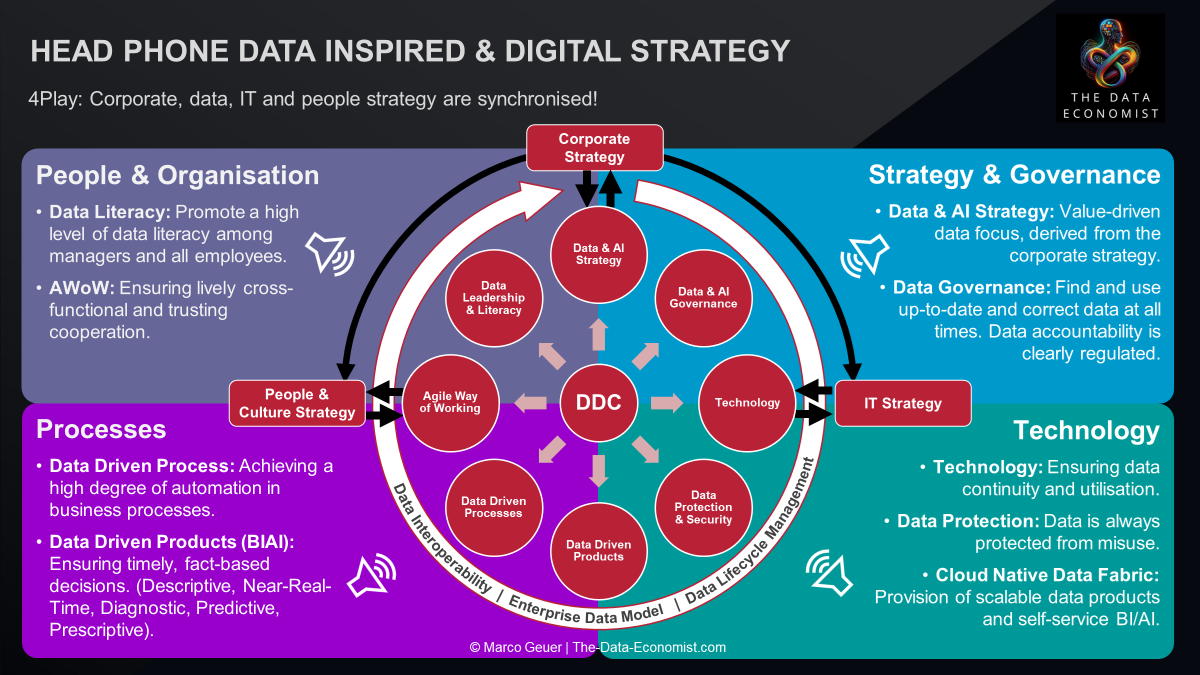From titles to actions: Why true digital leadership needs more than just a fancy title
The truth about titles and tasks in the world of data
In the rapidly advancing digital and AI-driven business landscape, companies often face the dilemma of naming and defining roles, especially when it comes to managing and strategising data and its optimal use and monetisation. The debate around the role of the Chief Digital Officer (CDO) versus the need for a Chief Data Officer (CDO), Chief AI Officer (CAIO) or even Chief Data & AI Officers (CDAIO) is a shining example of this confusion. But does the solution really lie in creating new titles, or should we focus on sharpening up the roles that already exist?
The answer lies deeper than one might initially think. It's not just about finding a suitable title, but rather about establishing a culture and understanding around data. The already familiar and established role of Chief Digital Officer (CDO) provides a solid foundation. Instead of creating new, confusing terminology, companies should focus their energy on clarifying and expanding the responsibilities and tasks of this role.
The CDO is at the forefront of efforts to not only develop a strategy for data and analytics, but also to lead the automation of business processes, design end-to-end new digital business models, ensure end-to-end data analysis and AI implementation, and oversee data governance, data quality and data protection. These comprehensive tasks are crucial to remaining competitive and driving innovation in the digital age. They are not new territory, but should be understood as an integral part of every CDO's role.
The challenge lies in creating a culture that sees data not just as a tool, but as a central aspect of corporate strategy. Such a data culture fosters a deep understanding of how data can be collected, analysed and used to make business decisions and drive innovation.
So instead of calling for a CAIO, companies should focus on sharpening the role of the CDO and clearly defining their area of responsibility. This includes creating and maintaining a strong data culture that forms the foundation for all digital endeavours. By focusing on clear roles and responsibilities, rather than the creation of new titles, companies can reap the full benefits of digitalisation.
Ultimately, it's about bridging the gap between traditional IT and business needs to create a truly data-inspired organisation. The answer to the challenges of digitalisation and data management lies not in introducing new titles, but in strengthening existing roles, cultivating a comprehensive data culture, implementing effective AI solutions and consistently focusing on automation, governance and quality. This is the only way for companies to unleash the true power of digitalisation.

Responsibilities and tasks of a Chief Digital Officer (CDO)
A Chief Digital Officer (CDO) plays a central role in the digital transformation and strategy of a company and the establishment of a data-inspired culture. The responsibilities and tasks of a CDO are comprehensive and multi-faceted, adapted to the dynamic requirements of the digital age. Here is a detailed list:
1. Digital Strategy Development
- Design and implement a comprehensive digital strategy that aligns with business objectives.
- Identify digital trends and technologies that could be beneficial to the organisation.
- Ensure that the digital strategy is flexible and adaptable to respond to market changes.
2. Leading The Digital Transformation
- Management and monitoring of digitalisation projects within the company.
- Promoting a digital culture and mindset among employees.
- Collaborate with all departments to integrate and coordinate digital initiatives.
3. Data Strategy & Management
- Development and implementation of a data strategy that includes data governance, data quality and data protection.
- Ensuring data integrity and accessibility for all relevant stakeholders.
- Promoting data-inspired decision-making processes throughout the organisation.
4. Automation Of Business Processes
- Identification and implementation of automation opportunities to increase efficiency and productivity.
- Monitoring the end-to-end automation of digital business models.
- Ensuring the scalability and flexibility of automated processes.
5. Introduction And Management Of AI And Data Analytics
- Leading the development and implementation of AI-based solutions and data analytics tools.
- Ensure that data-driven insights are used to improve products, services and customer interactions.
- Monitoring the ethical use of AI and data.
6. Governance And Compliance
- Monitoring compliance with data policies, data protection regulations and other relevant legal requirements
- Development and implementation of policies and procedures for data management and creation of high data quality.
- Risk management in connection with digital and data-related activities and the use of AI.
7. Stakeholder Management And Communication
- Communicating the digital vision and strategy to internal and external stakeholders.
- Building and maintaining relationships with key partners, suppliers and technology providers.
- External representation of the company in digital matters.
8. Innovation And Further Development
- Fostering a culture of data-inspired innovation within the organisation.
- Identifying and evaluating new business opportunities through digital and AI technologies.
- Ensure continuous improvement of digital tools and platforms.
9. Promotion Of Digital Sustainability
- Develop and implement digital and data-driven solutions that support and promote environmental sustainability.
- Ensure that digital initiatives and projects are designed with consideration of their environmental impact and resource consumption.
- Integrate sustainability principles into the digital strategy and all digital processes in order to make a positive contribution to environmental protection.
- Promoting the use of environmentally friendly technologies and practices within the company and in its value chain.
- Measuring and reporting the environmental impact of digital projects to ensure transparency and continuous improvement.
The CDO is therefore not only a technology expert, but also a strategic leader, innovator and change manager who navigates the company through the complexities of the digital and AI-driven world.

Data Strategy, Data Culture, Chief Digital Officer (CDO), Chief Data Officer (CDO), Chief Artificial Intelligence Officer (CAIO), Digital Strategy, AI Strategy, Data & AI Strategy, Chief Data & Artificial Intelligence Officer (CDAIO), Digital Leadership
- Geändert am .
- Aufrufe: 4203
